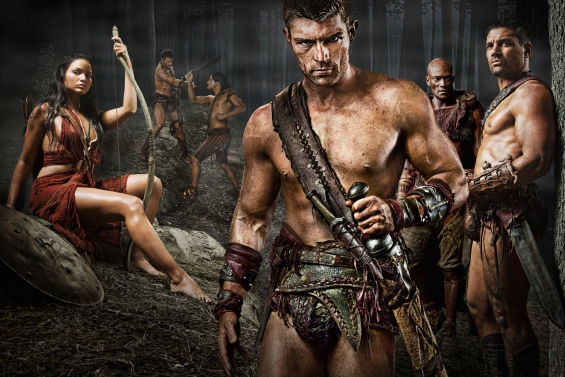

I’ve been enjoying, with a growing admiration, the New Zealand based Spartacus television series. I like it not least for the unique grammar the writers have developed. It’s a kind of a latinized English – mighty and subjectless sentences that are admirable.
The first episode nearly made me dismiss the show entirely. I didn’t like the 300-style effects, the slow motion blood, the constant bobbling of boobs nor the wall to wall green screening. But as the season went on I realized there was more to the show that the jeering mobs, the spectacle, and the nudity. By the final episode I was hooked. That was Spartacus: Blood and Sand. It gave us our hero’s origin story and his various reactions to slavery (denial, acceptance, pride, rebellion). And just as good were a pair of intensely (un)likeable villains, played by a pair of terrrific actors, showcased a cockeyed view of morality, Roman morality. Indeed, that first season began to tell the same story as the 1960 epic film staring Kirk Douglas (which itself was based on an book by Howard Fast). It did so at a slower pace, allowing for more of the historical detail to be played out.
Then there was the prequel series, Spartacus Gods Of The Arena, showing more of the background for the villains and supporting players. That season was supposed to be a stopgap, and it was, telling stories that were themselves only a background for the later seasons. But their own resonances resonated and proved themselves worthy. And now with the second (or third season depending on how you look at it) we have Spartacus: Vengeance, which outlines the beginnings of the bigger story, the latter half of the film version, and the massive slave rebellion that began in the Roman Republic.
the time, the first century BC, approximately 25% of all persons in Italy were slaves. And that’s where the heft of Spartacus comes from. It’s like Battlestar Galactica, but with a grounding in actual history. Spartacus was a real person. As were Crixus and Oenomaus. In these current episodes we see the foundations of the Third Servile War. It is history as drama, but it’s also the history of the opressed, not the rich, not popes, or kings, or robber barons. And this makes Spartacus unique among television programs currently airing.
Here are a couple of excellent old podcasts that made the show work all the better for me:
 Mike Duncan’s excellent and long running The History Of Rome podcast covered the Spartacus story back in 2008. It’s still available and still fascinating!
Mike Duncan’s excellent and long running The History Of Rome podcast covered the Spartacus story back in 2008. It’s still available and still fascinating!
|MP3|
Podcast feed: http://feeds.feedburner.com/TheHistoryOfRome
 Also in 2008 George Hageman, who had a great podcast called the Military History Podcast, looked at the story of Spartacus from a more battles-based-perspective. Perhaps giving us a peek at the next season?
Also in 2008 George Hageman, who had a great podcast called the Military History Podcast, looked at the story of Spartacus from a more battles-based-perspective. Perhaps giving us a peek at the next season?
|MP3|
Podcast feed: http://geo47.libsyn.com/rss
Posted by Jesse Willis